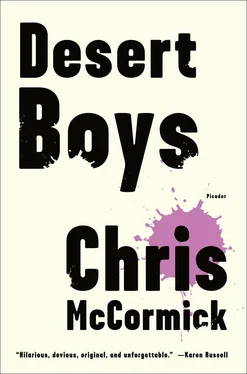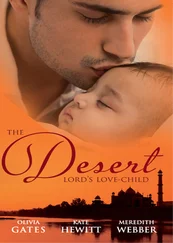* * *
In May, Reggie told the administrators he could no longer make the trip to the school. Instead, he asked that they send the students to his farm. He blamed his health, though my guess is he just didn’t want to drive across town anymore, having reached the time in his life when he relied on a consistency in scenery.
Despite knowing that most of the Future Farmers had chosen not to take part in the field trip, Reggie might have imagined a cavalcade of school buses wobbling in the heat off the paved road from town. As soon as he saw the lone purple minivan heading his way, however, he set aside his fantasy. He waved his cowboy hat to let us know we’d come to the right place, even though he knew the driver didn’t need any help.
I was one of five students — three boys and two girls — to scoot out the back of the van, followed by the driver, a bald man with a neatly trimmed red mustache. Reggie recognized him not only as Mr. Peterson, the parental advisor of our club, but also as his brother-in-law, Keith.
By now, Reggie had put back on his hat, which he tipped, and said, “Welcome, boys, girls. Keith.”
“Hey there, Reggie.” Mr. Peterson — Keith — reached out and pumped his hand.
After a moment, Reggie wiped his palms against his sandblasted jeans and said, “All right, then. Let’s start the tour.”
* * *
He lived in a two-bedroom house on a small alfalfa farm east of town, not far from the golf course I used to sneak onto a few years earlier. We all expected cows and pigs, but all he had were three acres of alfalfa, a horse, and six chickens in a coop along the northern edge. The farm was more for personal use than business, although he did make some money off the hay and never had to pay for eggs. The horse, Genie, had been his wife’s. Reggie, he told us plainly, had never learned to ride.
Throughout the tour, the other two boys kept clearing their throats intermittently, trading secret, profane messages in their coughs. I tried to make severe eye contact with Reggie, nodding up a sweat, in order to make amends for their attitude. One of the girls ended up doing what I didn’t have the courage to do myself: She confronted them. In her blond hair she wore a red headband, which brought out the pimple on her chin. I’d seen her on campus before — her name was Jackie Connolly, and her family ran a farm themselves on the other side of town — but I had never heard her speak until now.
“This trip is voluntary,” Jackie Connolly said. “No one forced you to be here.”
Although I appreciated her for scolding the boys, I found myself resenting her strict advocacy of the rules as if I were among the scolded. I understood her eagerness for the opportunity to reprimand the boys as a kind of disrespect toward the farm itself; only someone absolutely bored with an experience would use that fleeting time making sure others weren’t squandering it. I trusted Reggie felt the same.
The other girl in the group was Mr. Peterson’s — Keith’s — daughter, Charitye. It took me a moment to do the familial math and realize Charitye Peterson was Reggie’s niece. Through this new lens I watched her on the farm. At school, in her stylishly unstylish denim jackets and bloodred lipstick, she’d always seemed out of place — tall and stoic and urban like a beautiful door at the top of a New York City stoop. Everywhere she went, she carried a green spiral notepad, which complemented her long orange hair. She was a year ahead of me, a junior, but she still had the two-dimensional body of a boy — a fact that reminded me she was a swimmer. I watched Reggie ignore the bickering boys and the pimpled Jackie Connolly, studying Charitye, some distance from the rest of us, kneeling at the alfalfa. She wedged her pen between her thumb and palm so she could feel the leaves with her fingertips. Then she wrote in her notepad and stood, skinny and nearly as tall as Reggie in his boots, and faced the San Gabriel Mountains to the south like a statue engraved, WOMANHOOD.
Reggie returned to the finer points of fertilization, though I suspected his mind was elsewhere. Later I found out — though I might’ve known by the awkward handshake earlier and the way Reggie seemed unwilling to let Mr. Peterson out of his sight — that he was remembering the vague plan his brother-in-law had relayed to him over the phone earlier that day: The wife and I could use some time alone. Mr. Peterson had asked Reggie if it would be all right for Charitye to spend some time — a few days, maybe — at the farm.
Reggie’s wife, Allison, had died two years earlier — and so for two years, Reggie had been listening at night for the wind rattling the chains of the realty signs flanking his property. Sure, he told his brother-in-law. He could use an extra pair of hands.
At sunset, while we followed Mr. Peterson to the van at the edge of the road, Reggie pointed to the sky and told us the clouds at this time of day always reminded him of peeled tangerines. We boys and Jackie Connolly fought our way into the backseats of the van. Mr. Peterson unloaded a single large duffel and hugged Charitye, the only one of us to stay. Again the two men shook hands, and Mr. Peterson said to his brother-in-law: “I don’t mean to repeat myself, but please make sure she’s careful around that horse.” To which, Reggie smiled his cowboy’s smile and said, “We’ll be extra, extra careful.” Then we were off, and the dust behind the diminishing van rolled east with the light but influential wind. As Mr. Peterson’s van carried us away, I watched Charitye shrink in my window, scribbling in her notepad, craning her neck to the page, straining her eyes against the twilight.
In the van, Mr. Peterson said, “Kind of a kook, huh?” And when the boys laughed and the pimple on Jackie Connolly seemingly doubled in size as she chided them, I felt a deep, strange respect for Reggie, and a longing to have known him better.
So although I couldn’t see them any longer, couldn’t even see the farm — we were well on our way back to town — I imagined Reggie, a man who had always respected a person’s right to privacy, ask as gently as he could what Charitye was straining so hard to write in that notepad of hers.
“Lines,” she said, “for a poem.”
“Ah,” Reggie said, more a breath than language. “A poet. I once wanted to be a poet.”
“I figured,” she said, “what with the clouds and the tangerines.”
Reggie expected her to ask what had changed. He wanted, stupidly, to tell her that farming was a kind of poetry you got to do with your hands. He even had a little joke lined up about the two professions, how steeped they both were in anachronism. But by the time they made it back inside the house for dinner, the thread of the conversation had already been lost.
* * *
Since boyhood, Reggie had always appeared more confident than he actually was — lifting his chin when he spoke, projecting his voice, exerting little energy and displaying little patience with those who could not keep up — and for this reason, many of us Future Farmers believed he was born and raised on that little alfalfa farm of his. Sometimes, late at night, when he looked out at the silhouettes of Joshua trees dancing black against the deep blue between the stars, he bought into that story himself.
The truth was his father-in-law had owned the farm, and Reggie didn’t move out there from town until he and Allison had been married for sixteen years, when her mother died and it became clear the old man was soon to follow. Allison and her kid brother, Keith, fought about selling the land to the proprietor of the nearby golf course, a man named Knickerbocker, who wanted to build a new driving range on the property. Keith argued for the money — at the time, his daughter, Charitye, was an infant, and the money wouldn’t have been useless. Allison must have said something about keeping the farm in the family, because Keith, lifting his daughter in his arms as if she were a smoking gun, said, “I’m the only one with a family, Allie.”
Читать дальше












